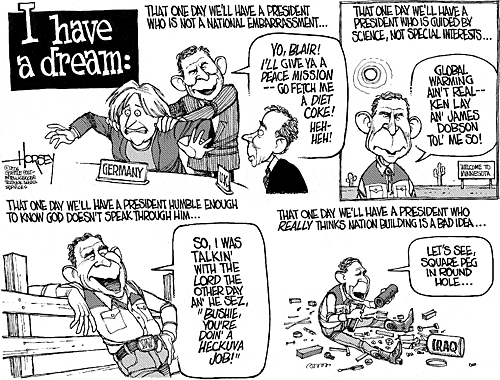Saturday, July 29, 2006
Reuters: UN rights body tells US to shut "secret" jails

UN rights body tells US to shut "secret" jails
By Richard Waddington2 hours, 36 minutes ago
A United Nations human rights body told Washington on Friday to close any "secret detention" centers for terrorism suspects, saying they were banned by international law.
Declaring it had "credible and uncontested" reports of such jails, the U.N. Human Rights Committee said the United States appeared to have been detaining people "secretly and in secret places for months and years."
"The state party should immediately abolish all secret detention," it said, echoing a similar demand in May by the U.N. Committee Against Torture.
In its findings on U.S. observance of the U.N.'s main political rights' treaty, the committee said that the International Committee of the Red Cross must be given access to anybody held during armed conflict.
The U.N. body also expressed concern at the acknowledged past use of interrogation techniques like prolonged stress positions and sleep deprivation that could be seen as torture.
While welcoming assurances that they were no longer used, it said it was worried the United States did not seem to see them as violations of international law. It also questioned the "impartiality and effectiveness" of investigations into abuse.
It called for reform of the Patriot Act, which granted the government expanded police powers after September 11, so that steps such as phone tapping or email monitoring were taken only when really warranted.
"We consider that the major violations were to do with the fight against terrorism," French magistrate Christine Chanet, who chairs the committee of 18 internationally recognized independent experts, told journalists.
MORAL WEIGHT
The committee, whose opinions carry moral not legal weight, rejected Washington's view that the International Covenant on Civil and Political Rights only applies on U.S. soil. In reply, the U.S. administration stuck to its line .
"We can understand the committee's desire to have the convention apply outside the territory ... but we must accept ... the way it was written," said State Department legal adviser John Bellinger.
Washington accused the committee of spending too much time on the United States.
"The recent committee conclusions on North Korea were about half the length of that on the United States," the U.S. mission to the United Nations in Geneva said in a statement.
The U.N. treaty lays down individual rights, including the right to equality before the law and protection against torture and inhumane treatment as well as from arbitrary arrest.
Rights groups urged the United States to heed the committee.
"If U.S. agents deliver detainees to countries where they face torture or keep people in secret prisons, they are violating fundamental human rights," said Alison Parker, acting director of the U.S. Program at Human Rights Watch.
The U.N. committee asked the United States to respond to its comments within a year. Asked what would happen if Washington took no notice, Chanet, said:
"There is a strong chance that they will ignore many of the recommendations. They are so certain about their position (but) we can always hope for a change of attitude."
The next formal U.S. review is due in 2010, but the latest U.S. report to the committee was seven years late.
(Additional reporting by Laura MacInnis)